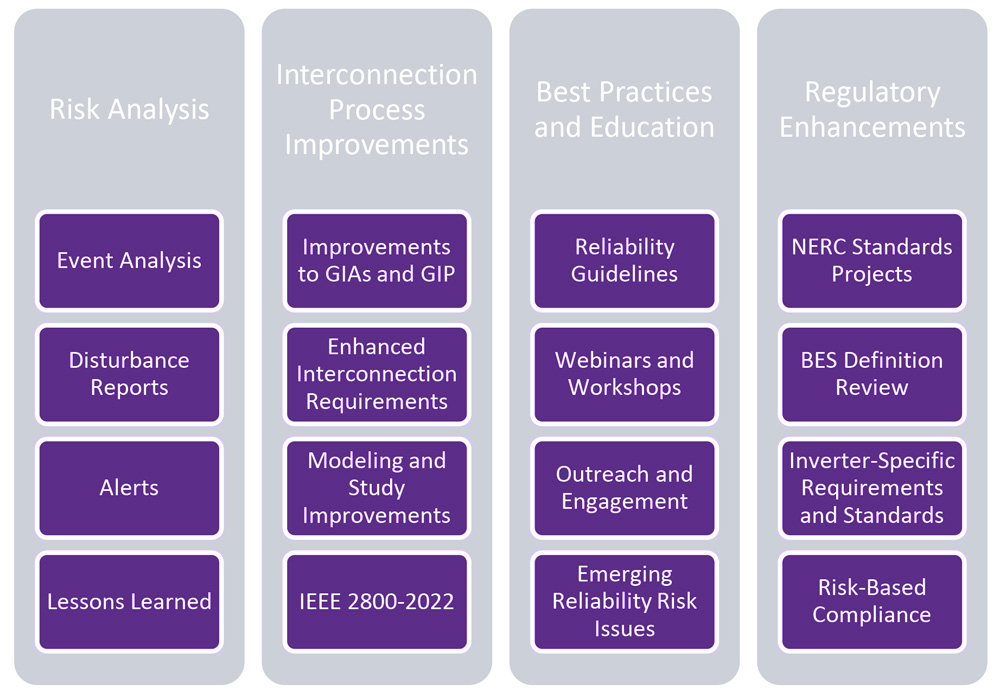
Calling the rapid growth of inverter-based resources on the bulk power system “one of the most significant drivers of grid transformation and … a high risk to BPS [bulk power system] reliability,” NERC on Wednesday published a strategy document outlining current and future work needed to help the organization address potential pitfalls of the new generation fleet.
NERC considers inverter-based resources (IBRs) to be generation types such as solar photovoltaic and wind facilities that “are asynchronously connected to the grid and are either completely or partially interfaced with the BPS through power electronics,” according to the organization’s draft reliability guideline for IBRs. Concerns about these resources have grown in part because of events like the Blue Cut fire in 2016, when erroneous tripping of solar generation caused the loss of 1,200 MW of output in Southern California.
Speaking at this week’s meeting of NERC’s Reliability and Security Technical Committee (RSTC), Ryan Quint, NERC’s director of engineering and security integration, explained that the organization has been working to address the risks of IBRs through initiatives such as the Inverter-based Resources Performance Subcommittee (IRPS). However, because there are “a lot of moving parts” to the issue, NERC felt it necessary to formalize an overall approach.
“We recognized [that] we needed to have a solidified, codified strategy to help bring things together, and we’ve heard that comment a couple of times here. So … this is that strategy,” Quint said. He added that a similar strategy for distributed energy resources — generation types that produce electricity but are not included in the bulk power system, such as rooftop solar panels and behind-the-meter batteries — “is in the works and will hopefully be coming at the December RSTC meeting.”
Report Outlines Risk Mitigation Approach
The Inverter-Based Resource Strategy document outlines a risk mitigation framework with four key tenets: risk analysis, interconnection process improvements, best practices and education, and regulatory enhancements.

Risk analysis includes NERC’s monitoring and awareness tools such as the event analysis process, disturbance reports, alerts and lessons learned reports. Interconnection process improvements include enhanced interconnection requirements, updated generator interconnection procedures and agreements, and the Institute of Electrical and Electronics Engineers’ 2800-2022 standard, which sets “uniform technical minimum requirements for the interconnection, capability and lifetime performance” of grid-connected IBRs.
The last two sections involve NERC’s reliability standard and reliability guideline development processes, along with industry outreach and engagement. NERC observed in the report that “reliability guidelines related to IBRs are the most commonly downloaded documents on [its] website” and that webinars on inverter-related topics “often have over 1,000 participants dialing in.”
NERC has planned several activities to support the strategy, such as issuing a Level 3 alert that “would enable industry action while reliability standards are being developed.” The organization is also considering updating its definition of the bulk electric system, which was last revised in 2014, to better account for IBRs.
Finally, the IBR document includes a series of IBR-related milestones to be presented to the RSTC at future meetings. These include standard authorization requests to begin projects aimed at revising NERC’s current standards — three of which are planned to go before the committee by the first quarter of 2023 — a set of reliability guidelines to be completed by the end of 2022, and white papers on IBR reliability issues and commissioning best practices to be submitted by the middle of next year.



